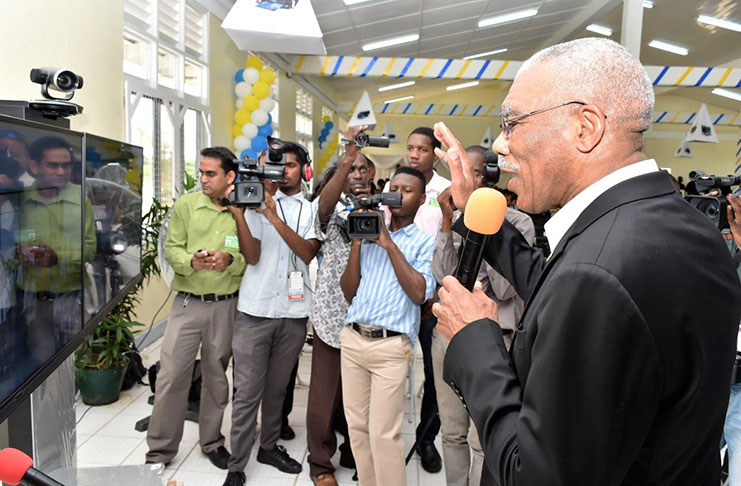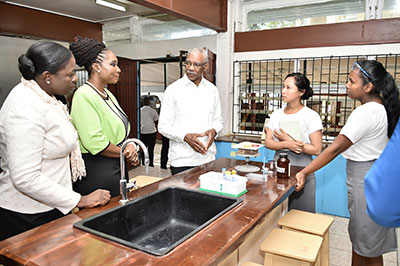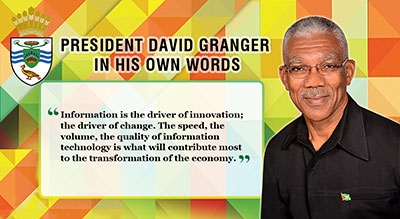TO truly transform Guyana into the education nation the President envisions, the root causes of deficiencies in the education sector must be addressed. Chief among the critical areas to be addressed are teacher education and training, and of course, if Guyana is to catch up with the rest of the world, access to Information and Communication Technology.

Teacher Education and Training
An investment in a corps of qualified teachers, who have specialised training to meet the needs of all of Guyana’s children, regardless of ethnicity, geographic location or other socio-economic factors, will be the driver of a more educated workforce, graduating young adults, who are equipped to meet the challenge of harnessing the country’s resources to bring about economic prosperity.

Principal of CPCE, Ms. Viola Rowe interacting with students of the CPCE during a visit
to the Science laboratory
With this in mind, the Head of State is intent on better equipping the Cyril Potter College of Education (CPCE) to ensure that a full cadre of adequately qualified teachers graduate each year. CPCE provides initial, formal teacher training in education. Some of the programmes offered include the one-year Associate Degree in Education and the two-year Associate Degree in Education (ADE) programmes, the Trained Teacher Certificate Programme (TTCP) and the Teacher Upgrading Programme (TUP).
Speaking to the graduating class of 2016 at CPCE’s 82nd graduation ceremony at the National Cultural Centre (NCC), in December, 2016, the President said that as Guyana advances its ‘green’ agenda, teachers must be able to train a generation of professionals, who are able to develop the nation’s resources and take advantage of opportunities that will become available. The Head of State said that teachers must be more than tutors; they must be agents of socialisation, implanting knowledge, imparting values and infusing the right attitudes in their students.
Teachers, through training, President Granger said, must be exposed to modern teaching skills, so that they can be effective in transmitting knowledge to, and in building character in students. The President said, “The untrained teacher has no place in the future of the education system in Guyana…Why should anyone allow their children to be taught by an untrained teacher? We are looking for total training…Every teacher must be trained. Trained teachers are essential to halting the decline in educational standards.”
The Head of State sees teacher education as a commitment to life-long learning. Beyond CPCE, President Granger has outlined a policy, which will ensure university-level qualified teachers in schools across the country. “We hope that over the next 15 years between 2015 and 2030 during the period of the SDGs [Sustainable Development Goals], our teachers will all have the opportunity to be exposed to tertiary education,” the President said.
Minister of Education, Ms. Nicolette Henry, noted that a policy decision in this regard would only yield positive results. From a technical perspective, she believes that there is value in having academic degrees as CPCE prepares teachers for delivery.
On July 26, 2017, President Granger accompanied by Minister Henry, met with students and staff of the CPCE, as he continued his outreach to educational institutions in what he calls fact-finding missions to hear directly from the administrators and beneficiaries, even as Government zeroes in on modernising and reforming the education sector.

they can be effective in transmitting knowledge to, and in building character in students
The forum was highly interactive as it allowed both staff and students of the institution to speak freely on issues that are affecting them. The Head of State explained to students and instructors at the college that his administration recognises the importance of these consultations and acknowledges that much more needs to be done to ensure that the CPCE is better equipped to effectively train the nation’s teachers, but the inputs of qualified stakeholders in the reform process are needed.
The student teachers raised concerns relating to the unavailability of staff, which resulted in first and second semester courses being completed in the fourth, fifth and sixth semesters and increasing the workload. “That caused us a lot of inconvenience, because we would be leaving here six and after six in the afternoons, then we only have Saturdays and Sundays. We have to prepare, we have housework to do… then we have to prepare for teaching practice again on Monday, Tuesday and Wednesday and we know primary is a lot,” one student teacher noted.
There were calls for the stipend to be increased annually, adequate accommodation in the science laboratories, a more structured curriculum and better accommodation and meals for the CPCE students.
“You don’t have to put a lot of strain on the budget. Raise it [stipend] gradually every year, because every year the cost of living is going up,” suggested a final-year student.
His colleague pointed out that, “The technology laboratory does not facilitate the number of students especially in the Early Childhood and Primary classes,” while another expressed that “After we have spent close to a year in the schools, we have tested the students, given assessments etc…and then in the sixth semester, we are launched into a course where we are then taught how to correctly assess students.”
President Granger in response assured the student teachers that all the issues have been taken seriously and provisions will be made in the next fiscal year for these matters to be adequately addressed, noting that the Ministry of Education is committed to improving the college within the limits of its resources.
In the Hinterland, Minister Henry said that a special teacher training programme will be implemented, which will include the upgrading of learning resource centres and the alignment of teachers’ learning resources to improve student outcomes. The minister noted that, “Improving the quality of teachers’ education in the hinterland which will see us develop continuous professional development programmes geared at addressing teachers’ weaknesses and tailored to incorporate teaching in multi-grade settings. There is also provision in training and coaching in the Science Technology Engineering and Mathematics (STEM) for teachers and literacy for teachers.”
Information and Communications Technology (ICT)
The Government of Guyana through the Ministry of Education, the Ministry of Public Telecommunications and the National Data Management Agency (NDMA), has embarked on an ambitious plan to ensure that Information and Communication Technology forms a central part of education delivery in the classroom and that more students and teachers have access to the World Wide Web.
The National Information and Communication Technology Strategy is intended to provide the framework to guide the development of the ICT sector and a key component of it will ensure a greater presence of ICT in the classroom. Part of its outcome objectives is focused on the development of smart classrooms and eLibraries for distance education and eLearning. But for e-learning to be possible, teachers themselves must be comfortable with ICT and must have access to computers and other such devices if they are to lead the way towards a smarter classroom. President Granger wants to ensure that teachers across the country have access to computers.
The One Laptop Per Teacher (OLPT) initiative forms part of the larger Improving Digital Equity, Access and Learning (IDEAL) programme that also includes connectivity to the internet for schools. The IDEAL programme was launched in September 2016 by President Granger as the beginning of a process of ICT transformation throughout the education system. Thus far, 8,944 laptops, which have been pre-programmed with the necessary teaching syllabus and materials, have been distributed to teachers across the country.
The ICT Unit of the Ministry of Education has reported that it has successfully trained 5,500 teachers in Basic Computer Literacy.
Additionally, 180 secondary school teachers are competent to deliver the Caribbean Secondary Education Certificate (CSEC) ICT syllabi. Additionally, 150 primary schools have been trained in the use of low-cost technology. A total of 95 secondary schools have been connected to the eGovernment Network. The e-Government programme increases government’s and the country’s capability to make Internet connectivity available to all citizens in the city, other parts of the coastland and hinterland communities.
The eGovernment Agency’s Secondary School’s Internet Connectivity Project helps to achieve the goal for greater ICT in schools. To date, over 100 educational institutions in Regions Two, Three, Four, Five and Six have been connected to the eGovernment network and provided with internet access. Plans to extend this network to communities in the hinterland have begun, and are expected to be executed this year. The connectivity programme is another testimony of the Government’s push for the implementation of STEM, which President Granger has said should be embedded in all levels of the schools’ curricula.
The President, speaking during the Berbice High School Centenary celebrations in September 2016, stressed that an education founded in the Sciences, Technology, Engineering and Mathematics (STEM) subjects is key to innovation and transformation of the country. “Education in the Sciences, Technology, Engineering and Mathematics, what is now called STEM is the key to innovation and transformation, Guyana’s capacity to compete in global markets will rely on our ability to innovate, innovation requires that greater emphasis be placed on Education, particularly STEM education, the greatest innovation in the global economy is in the Scientific and Information Technology fields,” President Granger said.
The STEM initiative, which is being implemented in schools all across Guyana, runs parallel to the President’s National Endowment for Science and Technology (NEST) programme. The programme has its genesis in the presentation of $1M cheques to several schools in 2016, including the Berbice High School, Queen’s College and President’s College, to improve computer and science laboratories, as part of the Head of State’s push to promote STEM education through investment. In June 2017, $1M cheques were presented to 13 secondary schools under NEST.
The schools included Queen’s College, Bishops High, St. Roses High, St. Joseph High and the St. Stanislaus College, from Georgetown. The Anna Regina Multilateral from the Pomeroon-Supenaam Region (Region Two), Zeeburg Secondary and the Saraswati Vidya Niketan (SVN) Hindu School on the West Coast of Demerara, Essequibo Islands-West Demerara Region (Region Three). President’s College on the East Coast of Demerara, Rosignol Secondary, West Coast, Berbice and Berbice High, East Berbice-Corentyne Region (Region Six), Three-Miles Secondary in Bartica, Cuyuni-Mazaruni Region (Region Seven) and the Mackenzie High School in Linden, Upper Demerara-Upper Berbice Region (Region 10).
Head Teacher of the Zeeburg Secondary, Ms. Bonita Blair, said that the initiative will result in enhanced learning among the students, as well as improved results at the CSEC level, across the board. She noted that “there are [sic] a lot of stuff online and teachers can go and download items as it relates to their subject areas and they can use them in the classroom…teachers are requesting projectors not only in the Maths and Science but in other subject areas, so I think that would improve teaching in general.”
Head Teacher of Queen’s College, Ms. Jackie Ralph, said that particular attention is paid to Science and Technology, since the school’s administration also recognises that Guyana cannot move forward without their inclusion. She said, “we believe that we must set the trends. We have been creating an environment where our students are exposed to the highest level of Science education and Technology. We have also established the Sci-tech club, so some of the money will be going to the Sci-tech club, so that our students can start building their own computers.” Meanwhile, Head Teacher of the Anna Regina Multilateral School, Mr. Laljeet Rooplall, expressed his gratitude to the Government of Guyana, which he said will go a far way in boosting the school’s laboratories, “we have the chemistry, physics, biology and two IT labs. This will strengthen these labs and that will enhance performance significantly, which we are hoping for.”
The focus on STEM education, though in its early phases, is beginning to bear fruit, according to Minister Henry. She noted that students are now exposed to hands-on interactive experiences in the classrooms, enabling them to better relate to the new areas of knowledge. “One of the great benefits I believe of the STEM education is the ability to promote critical thinking both in and out of the classroom. We have witnessed the use of micro science kits that certainly would have proven useful in the teaching of Science in our schools, and these kits augment and in some cases provide alternatives to science labs, that are not found in primary schools; through this students now have the opportunity to work individually or in small groups on various practicals that are not only mandated by CSEC, but help students to develop investigative skills and competencies,” Minister Henry highlighted.
The minister said that students at the CSEC level have shown improvement in their experimental abilities and have achieved better grades in various subject areas.
This year, Guyana performed exceptionally well at the Caribbean Advanced Proficiency Examination (CAPE), securing 100 per cent pass rates (Grades One to Five) in 30 units, including Computer Science Unit 1, Information Technology Units 1 and 2, Applied Mathematics Unit 2, Animation and Gaming Units 1 and 2 and Digital Media Units 1 and 2. The country also secured an overall per cent pass rate of 92 at the examination.
Overseas-based Guyanese Ms. Karen Abrams, brought the Robotics Camp to Guyana in August 2016 and since then Robotics Clubs have been established all across Guyana. Through the Office of the First Lady strong focus is placed on training programmes, particularly in the area of ICT in various communities including Buxton/Friendship and Lusignan, which are being run parallel with the President’s NEST programme.
First Lady Mrs. Sandra Granger, speaking at Guyana’s first STEM Robotics Exhibition in June, 2017, emphasised the importance of an advanced ICT system if the country is to be on par with international best practices. Mrs. Granger said, “Computer Science and technology are going to be where the jobs will be. As a matter of fact, it is predicted that 75 percent of the jobs in the future will be in Computer Science, so if the children and young people in Guyana don’t catch onto that idea, while also becoming literate and numerate, we are going to be in a society that is always catching up and not quite getting there.” Events of this nature, the First Lady said, are aimed at unleashing the creative potential of Guyana’s youth in the use of Science and Technology for the development of their communities and the country in a global digitised era.
The success of the STEM Guyana team at the 2017 First Global Challenge is testimony to the value of these kinds of investments by Government and the private sector for the development of STEM education. The team placed 10th out of 165 competing countries.
But STEM education is not just for the secondary level. The $50M Youth Innovation Fund (YIF) that was introduced in the 2017 National Budget caters to young people who wish to advance their creative ideas in the field of science and technology. The programme, which focuses on both in and out-of-school youth, is in keeping with the Government’s ‘green’ agenda and will focus on solutions for the reduction of fossil fuel usage and the STEM programme. Under YIF, young people across Guyana can begin to tap into their creative abilities with the use of modern technology to explore how they can contribute to the development of ‘green’ technology and the increased use of clean energy.
The in-school component is aimed at raising awareness among primary and secondary-level students by having them participate in competitive activities that will challenge them to create solutions to address current global challenges, while utilising STEM subjects. Out-of-school youths will be required to submit proposals of projects, which they believe can benefit their communities or schools. These proposals will then be reviewed and those that meet the criteria will be selected by a panel from the Ministry of Education, Department of Culture, Youth and Sport. The YIF will be accessible across all the regions, with ministry officials stationed in each region to assist the participants with the proposals.




.png)









